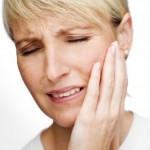In many cases, headaches are caused by dehydration; however, if you are continually experiencing headaches and you’re not dehydrated and you’ve had your eyes tested, you may wish to consider seeing your dentist. In some cases, headaches are associated with oral health and seeing your dentist could help you to identify the cause and find a suitable solution to rid you of nagging pain.
There are various dental issues, which may be contributing to headaches and migraines; possible explanations include:
TMJ disorder
TMJ disorder affects the temporomandibular joint, which is the joint that connects the jaw to the skull; if you place your fingers in front of your ear lobes on your face, and move your mouth, you will feel the TMJ working. TMJ disorder is a term used to describe pain, stiffness and restricted movement in the temporomandibular joint; it can be caused by many factors, from stress and anxiety to teeth grinding and malocclusion. Many people experience symptoms of TMJ disorder without seeing their dentist and often, the problems clear up without the need for treatment; however, if pain persists, you should see your dentist, so that the cause of the problems can be addressed.
Teeth grinding
Teeth grinding, also known as bruxism, is fairly common, but many people don’t realise that they do it because it happens subconsciously during their sleep. Teeth grinding can lead to tooth wear and tear and it commonly results in headaches and pain in the facial muscles. The best solution for teeth grinding is wearing a night guard, which is similar to a mouth guard, to prevent contact between the teeth. Bruxism is often associated with stress and stress management techniques can help to reduce clenching.
Malocclusion
Malocclusion is a term used to describe a bad bite; the bite is the way the top and bottom sets of teeth fit together when the jaw is relaxed. If the teeth are poorly aligned, this can result in muscle strain and teeth grinding, both of which may cause headaches. The best solution for malocclusion is orthodontic treatment; orthodontic treatment straightens the teeth and corrects the alignment of the teeth and the bite.
Dental decay
Poor oral hygiene is likely to contribute to the formation of dental cavities, which are holes in the teeth. When there is a hole in the tooth, the nerve can become exposed and this causes pain and discomfort, usually when you bite down on something or you eat or drink very hot or cold food or drinks. When the nerves in the tooth respond, they can also send signals to other parts of the head, which may result on headaches. It is important to see a dentist if you experience symptoms of decay, as infection can spread through the tooth and cavities can get larger, which weakens the tooth and makes it vulnerable to damage.
Dental abscess
A headache is a common symptom of a dental abscess. Dental abscesses are caused by harmful bacteria and they are usually very painful; most people experience a severe, throbbing pain when they have an abscess. Dental abscesses should be treated as a dental emergency. Pain signals associated with an abscess can travel to other parts of the face, triggering pain; often, where a tooth is inflamed, the added pressure on the nerves caused signals to travel through the nerves, resulting in a stabbing pain in the head. Treatment for dental abscesses involves draining and removing the abscess.
Originally posted 2013-08-28 06:41:54.